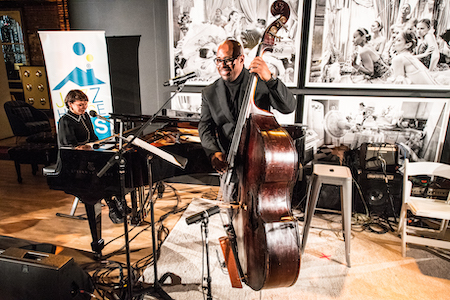Jan 13, 2026 2:09 PM
More Trump-Kennedy Center Cancellations
The fallout from the renaming of the John F. Kennedy Center for the Performing Arts to include President Donald…

Norah Jones and Christian McBride perform at the sixth annual Jazz Set benefit concert.
(Photo: Jazz House Kids)His left hand on the bass, Christian McBride spoke with playful conviction: “You’re out of your mind.” Norah Jones smiled. From her duo mate, she coaxed a reluctant solo out front as the two artists opened their set at the Ralph Pucci Gallery on West 18th Street. A moment later, blowing his charming self-effacement into oblivion, McBride delivered a brief and greasy solo before they dug in to Hank Williams’ “Cold, Cold Heart.”
Jones and McBride hadn’t played together before that evening. But their February performance marked the sixth annual Jazz Set benefit concert, one that designer and arts patron Ralph Pucci has curated for the New Jersey-based education and performance organization Jazz House Kids. Before long, the artists’ distinct, recognizable expressions settled into a single gesture of spontaneity and joy. For Jazz House Kids founder and President Melissa Walker, that’s the whole idea:
“Jazz says, ‘You don’t have to sound exactly like me. You can be Cannonball Adderley, and you can be John Coltrane, and we can be in the same piece of music.’”
Jones and McBride, the latter serving as JHK artistic director, played selections from the singer/songwriter’s canon as well as “The Nearness Of You,” inviting current students and alumni to join them on “Mercy, Mercy, Mercy” and evening closer “Centerpiece.” Other student performances punctuated the hits, including those of “Autumn Leaves” and “Work Song,” performed by saxophonist-composer and former Jazz House Kid Birsa Chatterjee’s ensemble.
Over the years, Jazz Set has evolved to showcase three levels of student development, providing rising stars the opportunity to play with internationally acclaimed artists that have included Diana Krall, Laurie Anderson, John Pizzarelli, Wynton Marsalis and Esperanza Spalding. They glean valuable insight from their bandstand conversations, such as Jones’ recommendation to treat restaurant gigs as paid practice. This method of mentoring alongside practical curriculum renders the Jazz House attractive to students pursuing careers as touring artists. But its mission has a broader reach: to empower the whole student, positioning each of them toward diverse career success.
“Jazz House is the perfect place for someone who is super-serious about jazz,” Walker said. “But [it’s also] a fertile training ground for young people on and off the stage.” Citing former students who have assumed leadership roles in business, cybertechnology, law, military service and finance, she credits an intentional model for interdisciplinary success that combines community building and risk-taking. “When you’re pulling from 40 different communities — in the summer, seeing kids nationally and internationally — you get that rich cultural aspect of this music. Kids gravitate to that.”
That sense of community, at once sprawling and intimate, is integral to the Jazz House philosophy that students feel confident enough to make themselves uncomfortable only when they feel meaningfully supported. Ted Chubb, the organization’s director of cultural programming, as well as a trumpet player and composer, views the organization’s unique curriculum delivery as integral for student engagement and empowerment.
“When the music is taught from a perspective of cultural expression,” he said, “students feel more ownership … and see themselves as a part of the legacy and future continuum of the music.”
Jazz House instructors have included Mike Lee, Camille Thurman, Anthony Ware, Alexis Cuadrado and Abraham Burton, among other working artists. Luminaries who have shown their support with hands-on engagement have included Sheila E., Dee Dee Bridgewater, Wynton Marsalis, Dianne Reeves, Wayne Shorter, Angélique Kidjo and the late George Duke. Because leadership and faculty consider exposure and deep listening elemental, curriculum repertoire is staggering in volume and sophistication. Students face new challenges every week. But community-centered programming creates a kind of low-impact discomfort for students, promoting healthy risk-taking and leadership skill development. For a generation transforming every corner of the workplace and normalizing the career pivot, that skill-set proves crucial.
“These young people are poised for today,” Walker said. “They know how to manage their time, set their priorities, collaborate and approach what they’re doing with confidence. And they really can rise and improvise.” DB

Belá Fleck during an interview with Fredrika Whitfield on CNN.
Jan 13, 2026 2:09 PM
The fallout from the renaming of the John F. Kennedy Center for the Performing Arts to include President Donald…

Peplowski first came to prominence in legacy swing bands, including the final iteration of the Benny Goodman Orchestra, before beginning a solo career in the late 1980s.
Feb 3, 2026 12:10 AM
Ken Peplowski, a clarinetist and tenor saxophonist who straddled the worlds of traditional and modern jazz, died Feb. 2…

The success of Oregon’s first album, 1971’s Music Of Another Present Era, allowed Towner to establish a solo career.
Jan 19, 2026 5:02 PM
Ralph Towner, a guitarist and composer who blended multiple genres, including jazz — and throughout them all remained…

Rico’s Anti-Microbial Instrument Swab
Jan 19, 2026 2:48 PM
With this year’s NAMM Show right around the corner, we can look forward to plenty of new and innovative instruments…

Richie Beirach was particularly renowned for his approach to chromatic harmony, which he used to improvise reharmonizations of originals and standards.
Jan 27, 2026 11:19 AM
Richie Beirach, a pianist and composer who channeled a knowledge of modern classical music into his jazz practice,…